|
Notes For “Just Sittin’ Around The House”
by Evan Cantor
Original cassette liner indicates:
c. 1987 all songs by Evan Cantor all instruments by Evan Cantor; recorded in March & April 1987 1005 Marine St. Boulder CO 80302 (postal address at that time) SOP 106, Sound of Pig Music c/o Al Margolis, 28 Bellingham Lane, Great Neck NY 11023 USA (address of course no longer current)
At the time of WoG’s break-up, I was concerned about how my musicianship was being perceived by the underground. Despite all the myths about Walls Of Genius being idiot-savants wailing away with no musical background or chops, I was feeling un-appreciated for all the musical chops I brought to the table. For instance, I could sing in many different voices, but everybody seemed to think those voices were Little Fyodor, or so I perceived. So I was ready to assert a part of myself that had been subsumed by Walls Of Genius.
“Just Sittin’ Around The House” became a sort of “All Things Must Pass” for me, music that had been literally been ‘sittin’ around the house’ for years. Although I received positive reviews for this album, I realized, or thought, that this wasn’t really the kind of music that was in synch with the cassette underground of the 80s. For me it may have been experimental—yes, I was experimenting with different tunings, but primarily the tunes are very conventional. A lot of tunes like this were incorporated into Walls Of Genius titles, but they had always been engineered to be “odd” or “off-beat” in some way, something “experimental”. At the time of the WoG break-up, I needed something conventional. Not only was I concerned over the perception of my musician-ship, I also feared that the Walls Of Genius “scene” would banish me forever to a life lived on the fringes of society, that if I continued with it I would never have a satisfactory sex life again and never meet anybody but the weirdest members of a small segment of society. So, in some sense, “Just Sittin’ Around The House” was an effort to counter-act all that. But not long afterwards, I dropped out of the underground scene, believing that nothing would ever come of it in the future. I’ve said it before, but I’ll say it again: I was wrong. In any case, the recordings I made subsequent to this album were not, as far as I can recall, introduced to the Cassette Culture underground. I made a series of recordings starting with “Hell Is Empty…”, which focused on more original material, and then “Chestnuts” and “Straight Covers”, both of which were cover versions of classic rockabilly and top-40 songs. My recollection is that none of these recordings were presented to the Cassette Culture, although I would have distributed some of them to friends and family. As I have a nagging memory of somebody saying something nice about my version of “Love Potion #9”, I may be remembering this inaccurately. - Evan Cantor May 18, 2018
3 Comments
Little Fyodor:
Is it Little Fyodor or is it Walls Of Genius? Or is it both? Ironically, although officially a Walls Of Genius release, the Slither/Sloth cassette represents the first, um, serious stab at my Little Fyodor solo career that was really my first musical ambition, at least since previously giving up music after playing two gigs in a cover band in high school.
This seriousness is reflected in the fact that I put out a 7 inch vinyl EP concurrently with the WoG cassette, the music of which takes up most of the first side of the tape that got released by Walls Of Genius as WoG025 in 1985. The last piece of that first side (Slither) and the entirety of the second (Sloth) are made up of material recorded at the Hall Of Genius in much the same manner as I recorded much material for WoG releases, overdubbed on the home studio, the heart of which was Evan's four-track reel-to-reel recorder and six-track mixer. The Slither EP material was recorded in an 8-track professional studio. I first entertained this Little Fyodor solo ambition before Walls Of Genius even started, and I continued it long after WoG (originally) ended. I've worked with a number of musicians over the years on this project, but for this first excursion, it was, as Evan puts it, the Walls Of Genius house band. So it was really a co-mixing of currents. I've written about the making of this cassette in much greater detail at Hal's Walls Of Genius archive page (and also made mention of the motivations behind my solo music making in a prior EC blog post), so I'll just say now that I'm proud to have it presented in the Bandcamp format to the Electronic Cottage community!  by Evan Cantor The success of Walls Of Genius, regardless of how you define it, was not solely due to the work itself. That product would have never been noticed by the “Cassette Culture” if it had not been for the persistent and successful creation of a number of mythologies, both self-conscious misinformation and unintended misconceptions, that added value to the product. Don’t get me wrong—Walls Of Genius would have existed regardless of the existence of a “Cassette Culture” and essentially did prior to our discovery of the scene. But the potential of an audience and/or market was a large motivator for development. Inspired thusly, Walls Of Genius reached out to the world in its own unique way. The first mythology pursued was the illusion of an active underground music scene in Boulder, Colorado. This evolved innocently from the original jam sessions. Disgusted with previous band experiences, I gave each recording a different “band” name. This was prior to the project coalescing as “Walls Of Genius” proper. There were The Dirt Clods, The Have Mersey Beats, Jerry’s Kids, The Ed’n’Evan Hullabaloo, Big Man On Campus, Good Enough For A Hell-Hole, et. al. These groups were eventually “presented by Walls Of Genius” on cassette albums before the truth was fully revealed, namely that they consisted of the same three core musicians: Evan Cantor, Little Fyodor and Ed Fowler. With the addition of guests (most notably Dena Zocher at the cello) and the strapping on of different musical instruments, each of these groups had a different “sound” and the illusion was complete. We allowed the illusion to perpetuate itself, as both a joke on the Cassette Culture scene and a marketing ploy to attract attention. There was an element of irony involved since Boulder’s music scene had previously been primarily associated with white-bread soft-rock acts like Dan Fogelberg and Firefall. Creating interest and curiosity, the ploy worked and when the illusion vanished, interest and curiosity remained. Eventually an actual underground scene in Boulder developed and we were a part of it. An illusion that took forever to vanish was that of Walls Of Genius as musical naïfs, primitives who didn’t know how to play their instruments but wailed away nonetheless. We encouraged this, going so far as to proudly name ourselves “Head Moron” and “Associate Morons” and issuing “Certificates of Genius” in childish, error-laden script. The emergence of Little Fyodor as one of Walls of Genius’ “acts” is a prime example musically, as were our collaboration as “The Fabulous Pus-Tones” and my autistic deconstructions of Creedence Clearwater Revival and Hank Williams titles as “Joe Colorado”. Little Fyodor (and he will likely disagree with me) had long been insecure about his chops on the guitar, but there’s no doubt the man can play. Of course, he has his own inimitable style, love it or hate it as you will. Before there was Little Fyodor, there was John Leningrad, writing distinctive songs before we ever teamed up as Walls Of Genius. In the process of creating the illusion of a scene, and partially as a result of the emergence of the Little Fyodor persona, I attempted with both music and literature (mail-order catalogs) to create the personas also of Joe Colorado and Red Ed. Ed never really warmed up to this, but I pursued Joe Colorado’s autistic deconstructions. So while we never had much in the way of Ed Fowler “solo” selections, there was plenty of Fyodor and Joe. Fyodor and I assisted each other with these constructions as that was the only way we knew to stretch the limits of 4-track technology. Two people recording simultaneously on each track gave you eight things going on instead of only four. It took concentration and cooperation. (I will discuss the perils and rewards of ‘group-think’ separately) Since Little Fyodor’s music (as well as my own) expressed a good deal of angst, romantic anomie and social alienation, I ran with those themes hyperbolically in the Walls Of Genius catalogs. I drew obscene cartoons, which Fyodor wisely chose to nix. But meanwhile, I drew more appropriate cartoons, wrote various over-the- top, patently ridiculous promotions and even had a tongue-in-cheek essay published, “The Curse Of Little Fyodor”. Perhaps I had gone too far. But in the long run, the persona of Little Fyodor was a successful creation, as evidenced by his long solo career as a performer and recording artist. The persona, or myth, of “Little Fyodor” that developed during that 80s heyday remains firmly in place.
Further, Walls Of Genius’ parodies of top-40 rock music, jazz deconstructions, folkie madness, extended improvisations and Wild-Man- Fischer-stylized autistic explosions could not have been accomplished if I wasn’t already an experienced musician, having played the bass and electric guitar in a number of bands since high school. Those bands, in no particular order, performed fraternity party pop (Long Lost Friend, Wishing Well), folk, blues & country (Folk Grass Blues Band), jazz (Mystic Knights Of The Sea), punk (The Blitz Bunnies), prog-rock (Dreamer Easy) and new-wave (Rumours Of Marriage). This experience was brought to bear when I decided I had had enough of the straight music business and started in with what eventually became Walls Of Genius. So if you listened carefully, you’d hear all of that experience manifested. But we allowed the illusion of musical naïfs to grow because it created more curiosity and interest in what we were doing, perhaps lending a strange kind of legitimacy to it, like outsider art. Of course there is the myth that we were just screwing around, that we never took what we were doing seriously. There is a grain of truth to this idea, but only a grain. The myth appears to live on to this very day, as if considering Walls Of Genius seriously is antithetical to the nature of the project itself. Proof that myth can sometimes be indestructible. Last on my list of myths is the one that developed all by itself in the years after our 1980s heyday, the idea that Little Fyodor was the prime mover and motivating force behind Walls Of Genius. This myth culminated in a recent review lauding Little Fyodor for vocalizations that issued from my own mouth and no other. Upon notifying the reviewer of this factual error, he published a retraction, adding the disclaimer that he hardly believed it. This stubborn myth evolved quite naturally out of circumstances. When I dis- banded Walls Of Genius in 1986, I dropped out of the Cassette Culture shortly afterwards and disappeared for almost 30 years, pursuing graduate school and then the visual arts, most notably in wilderness conservation. I truly believed that nobody would ever give a damn about Walls Of Genius or Little Fyodor. I am happy to report that I was wrong. I was unaware of the interest in Walls Of Genius that Little Fyodor had kept current in service of his continuing career in avant-garde performance. So it was his ongoing effort to keep Walls Of Genius alive that led to this particular misconception. Note that Fyodor himself never self-consciously promulgated this myth, it just arose all on its own. It’s an easy misconception to get. When one refers to “my old band from the 80s”, there is an element of ownership expressed that is both on-and- off the mark. I felt that Walls Of Genius was “my” old band from the 80s. I started it, produced it, recorded it, and ran it, sometimes despotically I admit. But as a primary member of the group, it was also Fyodor’s old band from the 80s. I credit Fyodor for having always been quite gracious about our collaborative efforts. |
Archives
January 2022
|
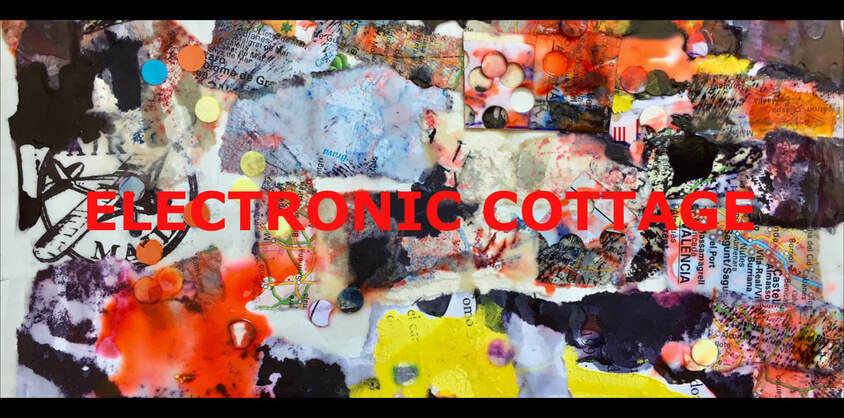
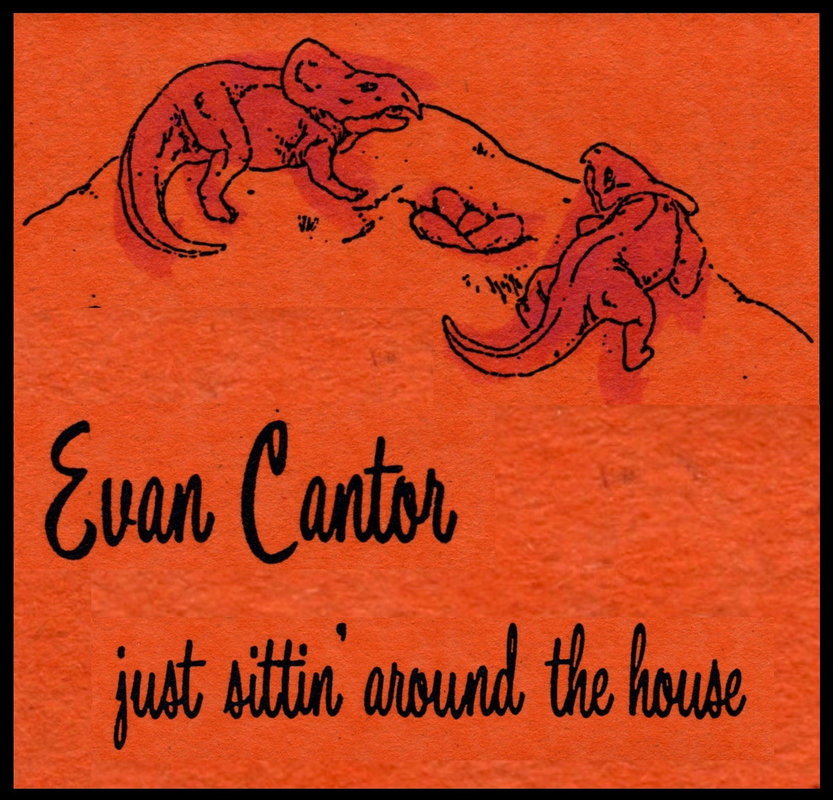
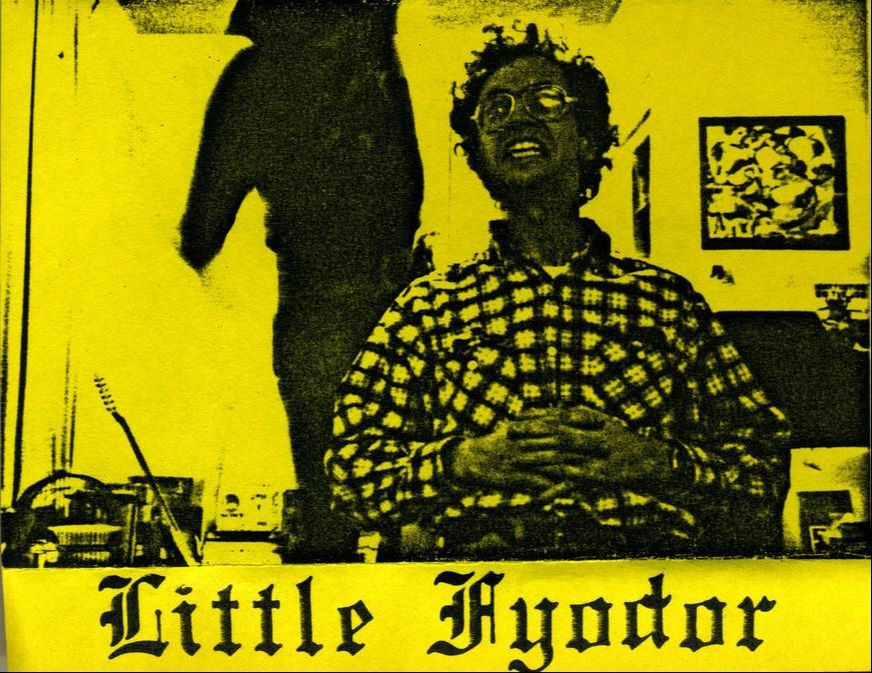
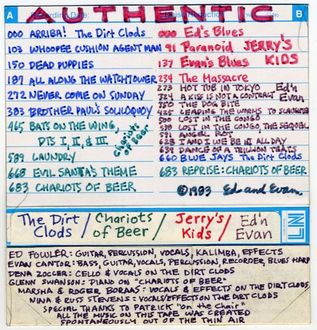
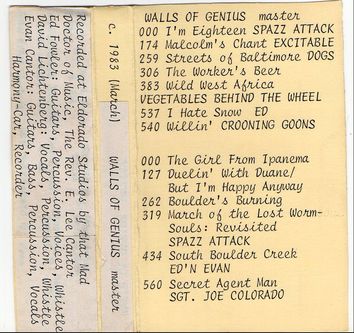

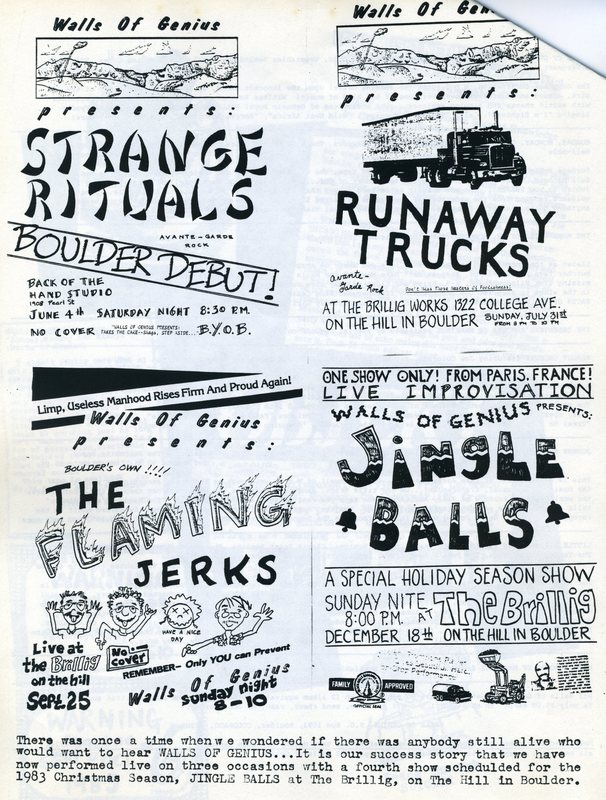
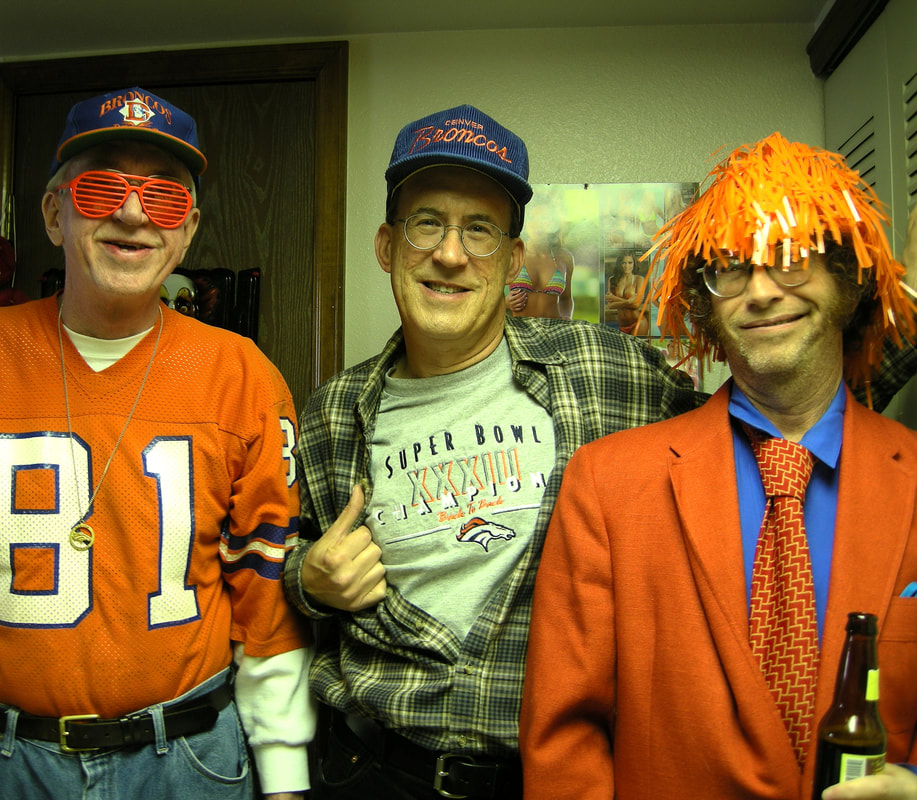
 RSS Feed
RSS Feed